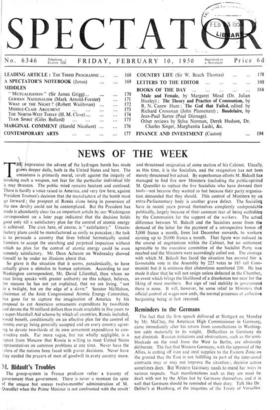M. Bidault's Troubles
The group-system in France produces rather a travesty of government than government. There is never a moment (in spite of the unique but uneasy twelve-months administration of M. Queuille) when the Prime Minister is not confronted with the revolt • and threatened resignation of some section of his Cabinet. Usually, as this time, it is the Socialists, and the resignation has not been merely threatened but actual. By superhuman efforts M. Bidault has managed to find five new Ministers (including the public-spirited M. Queuille) to replace the five Socialists who have downed their tools—not because they wanted to but because their party organisa- tion demanded that they should. This control of Ministers by an extra-Parliamentary body is another grave defect. The Socialist( have in recent years proved themselves completely undependable politically, largely because of their constant fear of being outbidden by the Communists for the support of the workers. The actual difference between M. Bidault and the Socialists arose from the demand of the latter for the payment of a retrospective bonus of 3,000 francs a month, from last December onwards, to workers earning up to 20,000 francs a month. That figure was reduced in the course of negotiations within the Cabinet, but no settlement agreeable to the executive committee of the Socialist Party was reached and the Ministers were accordingly called out. The courage with which M. Bidault has faced the situation has secured hin• a favourable vote in the Assembly by 225 votes to 185 (all Corn- munist) but it is ominous that abstentions numbered 200. He has made it clear that he will not resign unless defeated in the Chamber, an event which brings the likelihood of a dissolution too near for the liking of most members. But sign of real stability in government there is none. It will, however, be some relief to Ministers that official control of wages now ends, the normal processes of collective bargaining being at last resumed.


































